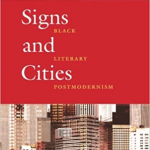2009
Scott Hermanson considers the Companion's success in negotiating its own position between digital literature and print media.
2008
Dave Ciccoricco reviews Michael Joyce's novel of network culture, Was. Seeing an inversion of Russian formalism in Joyce's work, Ciccoricco explores how Joyce's novel attempts to "reconcile the polylinguistic, stylistic, and ludic difficulty" of the text with an "affinity for the quotidian."
Michael McDonough reviews Brian Kim Stefans' book of poetry Before Starting Over, asserting that Stefans is concerned with the redefinition of critical discourse in the face of the loss of the singularity of the work of art. Stefans is not out to substitute an ideology of surface and take our deep meanings away. He mines contemporary poetics with an encyclopedic attention while resisting dogmatic assertions.
Amy J. Elias reviews Madhu Dubey's second book Signs and Cities: Black Literary Postmodernism and gauges the argument that we can locate within literary history a distinctive African American strain of postmodernism.
2007
For Jay Murphy, Clayton Eshleman in his JUNIPER FUSE makes a resounding case for lived experience, for the tortuous growth, however partial or fragmented, as rooted in self-suffering as modes of vision and dream.
Stephen Hawkins reviews Ronald Schleifer's Analogical Thinking, arguing that despite Schleifer's attempts at interdisciplinarity, his book falls short of a truly collaborative approach.
One of a series of eco-critical reviews, Stephen Dougherty explores the new ways that "matter is made to matter" in Ira Livingston's writing on science and literature. The payoff of an ecocriticism grounded in the materiality of language itself, can bee seen by the strong political positioning toward the end of Dougherty's essay.
Steven Shaviro reviews Shelley Jackson's Half Life, the first print-based novel by a pioneering hypertextualist.
2006
tobias c. van Veen reviews Paul D. Miller a.k.a. Dj Spooky that Subliminal Kid's MIT publication, Rhythm Science.
Bruce Clarke reviews Stephan Harding's Animate Earth and James Lovelock's recent book on Gaia, the mother of all systems.
Linda Brigham reviews Katherine Hayles' My Mother was a Computer: Digital Subjects and Literary Texts.
Tim Keane reviews David Matlin's Prisons: Inside the New America.
Sascha Pöhlmann reviews Lance Olsen's 2006 novel Nietzsche's Kisses.
Jacob Edmond reviews Brian McHale's The Obligation toward the Difficult Whole.
Walton Muyumba reviews two books: Michael Soto's The Modernist Nation: Generation, Renaissance and American Literature (2004) and Manuel Martinez's Countering the Counterculture: Rereading Postwar American Dissent from Jack Kerouac to Tomás Rivera (2003).
Eckhard Gerdes reviews Harold Jaffe's Terror-Dot-Gov: Docufictions.
Francis Raven reviews Lawrence Lessig's Free Culture: How Big Media Uses Technology and the Law to Lock Down Culture and Control Creativity.
Christopher Leise reviews Kenneth Bernard's The Man in the Stretcher and Richard Kalich's Charlie P, a work that is as much interested in the idea of the novel as it is a novel of ideas.
2005
Lori Emerson reviews The Shape of the Signifier by Walter Benn Michaels.
Julie Cupples reviews a retrospective collection of essays by Chandra Mohanty on the geopolitics of gender and race.
